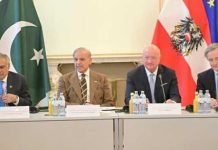Pakistan expects cooperation from Afghan interim govt as Terrorism a common threat
Staff Report
ISLAMABAD, Pakistan has said it does not believe in finger pointing because terrorism is common threat for both Pakistan and Afghanistan.
This was stated by Foreign Office Spokesperson Mumtaz Zahra Baloch, while replying to a question during her weekly news briefing in Islamabad on Thursday.
She went on to say government has started investigation into suicide attack in Peshawar. Precious lives were lost in terror attack. Pakistan expects cooperation from Afghan interim government. Terrorism is common threat both for Pakistan and Afghanistan. We hope no country will allow its soil to be used for terrorism.
The Spokesperson expressed Pakistan’s resolve to root out the evil of terrorism and safeguard the security of every citizen.
She said we do not believe in accusations or finger pointing. However, we would reiterate our expectations that no country should allow its territory to be used for perpetrating terrorism against Pakistan. It is time that the commitments made to the world are fulfilled with sincerity and in good faith actions.
Responding to another question, the Spokesperson said Pakistan has a foreign policy that prioritizes developing good relations with all countries.
She said we have constructive dialogue with all countries, including Russian Federation, the United States, the European Union, and our neighbors. She said bilateral relations with Russia, including economic cooperation, will further deepen in future.
Mumtaz Zahra Baloch informed that Minister of State for Foreign Affairs Hina Rabbani Khar will undertake a two-day visit to Sri Lanka from tomorrow.
The Spokesperson said that the Minister of State will participate in the 75th Independence Day of Sri Lanka as a Guest of Honour. In addition to attending the Independence Day events, she will call on the Sri Lankan leadership and hold a meeting with the Foreign Minister of Sri Lanka.
The Spokesperson further said Pakistan and Sri Lanka have historic ties that have grown steadily in all aspects of bilateral cooperation.
We also have worked closely in multilateral forums including SAARC. The visit of the Minister of State would contribute to enhanced understanding between the two countries and signal Pakistan’s support for Sri Lanka in a difficult time.
She said earlier, Foreign Minister Bilawal Bhutto Zardari undertook an official visit to Moscow at the invitation of Foreign Minister of the Russian Federation Sergei Lavrov from 29-30 January 2023. This was Foreign Minister’s first visit to Moscow which coincided with the 75th anniversary of the establishment of diplomatic relations between Russia and Pakistan.
Foreign Minister held delegation level talks with Foreign Minister Sergey Lavrov on 30th January 2023. The talks covered the entire range of bilateral relations with a special focus on trade and economic relations, energy cooperation as well as regional and global issues of mutual interest.
The two Foreign Ministers agreed to further enhance cooperation in the areas of trade, energy, education, culture, security and counter-terrorism. They also agreed on the importance of regular high-level exchanges and to continue bilateral dialogue mechanisms to explore mutually beneficial cooperation.
The two Foreign Ministers discussed global and regional issues, especially South Asia and Afghanistan. Bilateral cooperation at multilateral fora including SCO came under discussion.
Last week, Minister of State for Foreign Affairs, Ms. Hina Rabbani Khar led Pakistan delegation to UN Human Rights Council in Geneva. Minister of State presented Pakistan’s national progress report under the Universal Periodic Review, UPR-42.
In her remarks, the Minister of State highlighted legal, policy, institutional and administrative steps taken by Pakistan to promote human rights and fundamental freedoms. She reaffirmed Pakistan’s resolve to promote well-being and welfare of its people, build a democratic polity and foster an inclusive society. She noted the steady progress on implementation of recommendations made at Pakistan’s 3rd Universal Periodic Review and expressed Pakistan’s continued commitment to human rights.
On the sidelines of the event, the Minister of State held meetings with United Nations High Commissioner for Human Rights, Director General of the International Labor Organization, Director General of World Intellectual Property Organization (WIPO) and Secretary-General of the UN Conference on Trade and Development.
Special Representative for Afghanistan of the United States Thomas West and the European Union’s Special Representative for Afghanistan Tomas Niklasson visited Pakistan this week and held meetings with Special Advisor to the Prime Minister on Afghanistan, Ambassador Muhammad Sadiq and Foreign Secretary Dr. Asad Majeed Khan. During these meetings, the two sides discussed the regional situation including the recent developments in Afghanistan and humanitarian support to the Afghan people. The Pakistan side reaffirmed our commitment to a peaceful, stable and interconnected region.
Executive Director of the United Nations Environment Programme (UNEP), Ms. Inger Andersen is on an official visit to Pakistan from 30th January to 3rd February 2023. During this visit, she has engaged with different national stakeholders. Ms. Anderson called on the Prime Minister and held meetings with Minister for Climate Change, Ms. Sherry Rehman and the Foreign Secretary Dr. Asad Majeed Khan.
In these meetings, the ongoing cooperation between Pakistan and UNEP, including with reference to Pakistan’s efforts to build back better and greener after the last year’s floods was discussed. Pakistan reiterated its commitment to promoting partnerships at all levels in response to climate change and for protecting biological diversity and addressing waste and pollution.
As the current Chair of G77 & China (Nairobi Chapter), Pakistan is actively contributing to UNEP’s agenda and engaged in extensive dialogue on cooperation between UNEP and developing countries to address climate change, biodiversity loss, and ecosystem degradation.

















